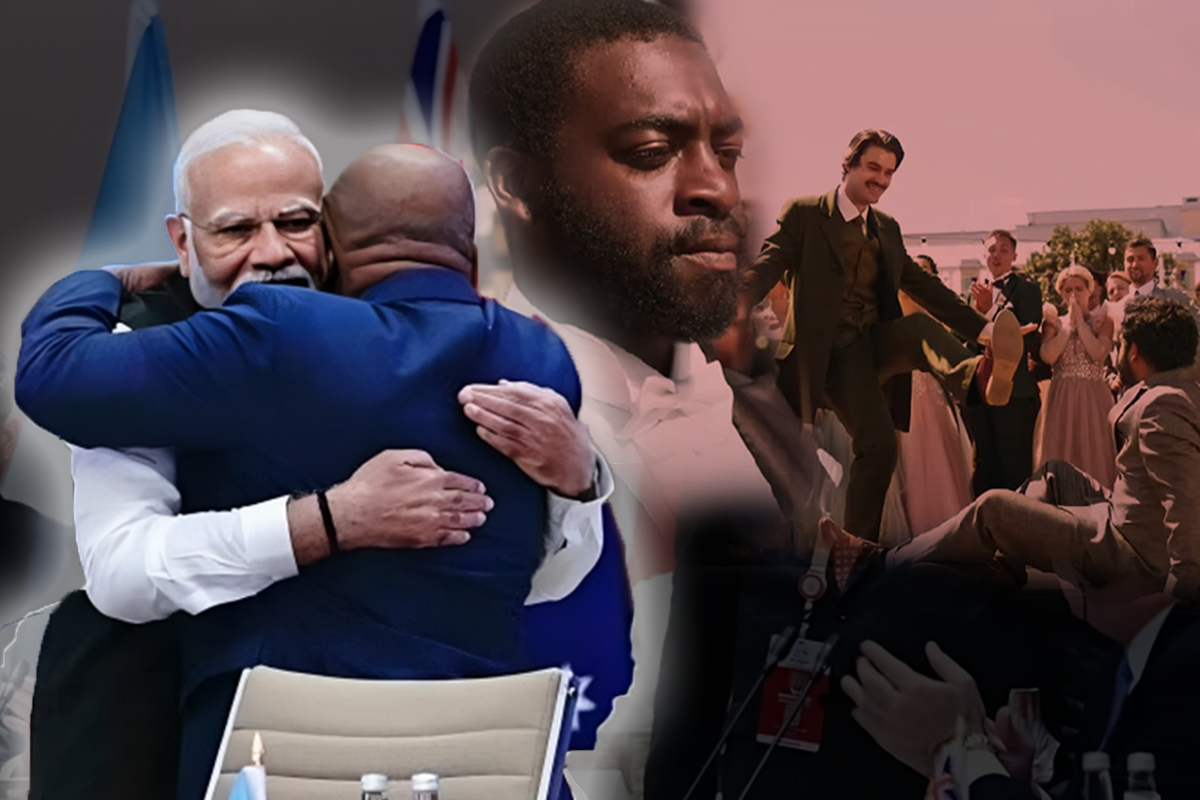
Prime Minister Modi’s focus on Africa is not a mere geopolitical strategy, it is also about healing the historical wounds of colonialism and exploitation.

In a pivotal scene in Rajamouli’s RRR, a magnum opus that blends grandeur with profound storytelling, we witness more than just high-octane action and patriotic fervour. In the scene building up to the global hit “Natu Natu,” a brown-skinned lead actor is subjected to insults from an obnoxious white man, while nearby, black musicians simmer with anger, carrying their own burdens of discrimination.
Rajamouli deftly captures the profound impact of colonialism on both the brown-skinned and black individuals in this one scene. It’s a moment of striking balance where Black and Brown merge, forming a formidable force united against the oppressive white. This powerful portrayal mirrors the essence of Prime Minister Narendra Modi’s recent announcement, welcoming the African Union as a permanent member of the G20. The move signifies a recognition of Africa’s growing influence on the global stage, echoing the unity against colonial oppression depicted in RRR.
India’s historical partnership with Africa, dating back to their joint fight against colonial rule, reflects a shared commitment to freedom and justice. The decision to include the African Union during India’s presidency in the Group of 20 largest economies in the world not only strengthens diplomatic ties but also embarks on a journey towards postcolonial solidarity that promises to heal the wounds of our collective colonial past and exploitation.
India’s history, like that of many African nations, bears the scars of colonialism and exploitation. The legacy of these dark chapters continue to cast a long shadow on our collective consciousness. It is important to recognize the historical context in which Africa was exploited by Western powers, including the United States, during the colonial era.
Throughout the 19th and early 20th centuries, Western powers scrambled to carve up Africa, exploiting its vast resources and labour force for their economic gain. The infamous “Scramble for Africa” (1884-1914) resulted in arbitrary borders that ignored the continent’s ethnic and cultural diversity, causing conflicts that persist to this day. The extraction of Africa’s natural resources, including minerals, rubber, and ivory, was rampant, often with little benefit to the local populations.
Furthermore, the transatlantic slave trade driven by Western powers, particularly the United States and European nations, represents one of the darkest chapters in human history. Millions of Africans were forcibly taken from their homeland and subjected to brutal conditions in the Americas, leading to immense suffering and loss of life.
Even after the end of formal colonial rule, the exploitation of Africa continued. Neo-colonial practices, economic dominance, and political interference by Western powers perpetuated instability and hindered African nations’ development efforts.
Today, as Africa faces contemporary challenges such as the urgent need to phase out fossil fuels and combat climate change, India’s partnership becomes even more crucial. Climate change poses an existential threat to many African nations, exacerbating droughts, floods, and food insecurity.
Additionally, the conflict-ridden Sahel region remains a pressing concern. With ongoing instability, terrorism, and humanitarian crises, the Sahel region demands concerted international efforts for peace and stability.
Against this historical backdrop, Prime Minister Modi’s commitment to building a partnership based on mutual respect, shared prosperity, and common development is a welcome departure from the colonial-era exploitation that characterised the past. India’s approach stands in stark contrast to the historical practices of Western powers.
One of the most notable aspects of Prime Minister Modi’s approach is the emphasis on collaboration rather than dominance. India is not seeking to impose its will or extract resources from African nations. Instead, it is offering a hand of friendship and cooperation. Meanwhile, economic experts have raised red flags against China’s expansionist plan through infra investments in Africa. The recipients of this capital, in the form of debt and equity, are mostly capital-starved underdeveloped countries in the continent. While India’s development assistance programs, such as lines of credit, technical expertise, and capacity-building initiatives, are empowering African nations to chart their own path to progress.
Prime Minister Modi’s focus on Africa is not a mere geopolitical strategy, it is also about healing the historical wounds of colonialism and exploitation. India’s development assistance to Africa is not about imposing its will or extracting resources. It is about helping African nations build their own future and chart their own course. India’s G20 Summit in New Delhi provided the most prominent platform to convey this message to the entire world.